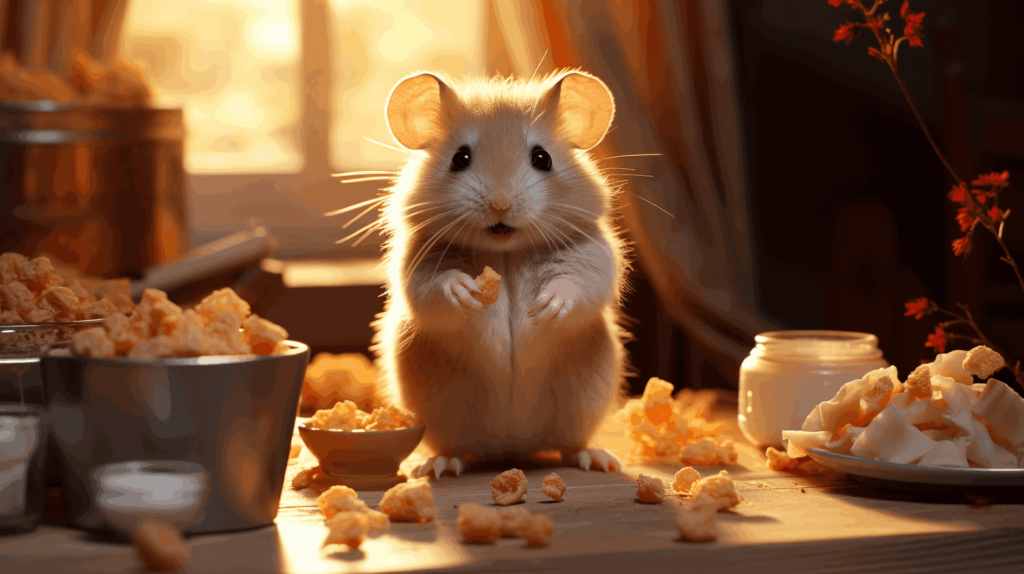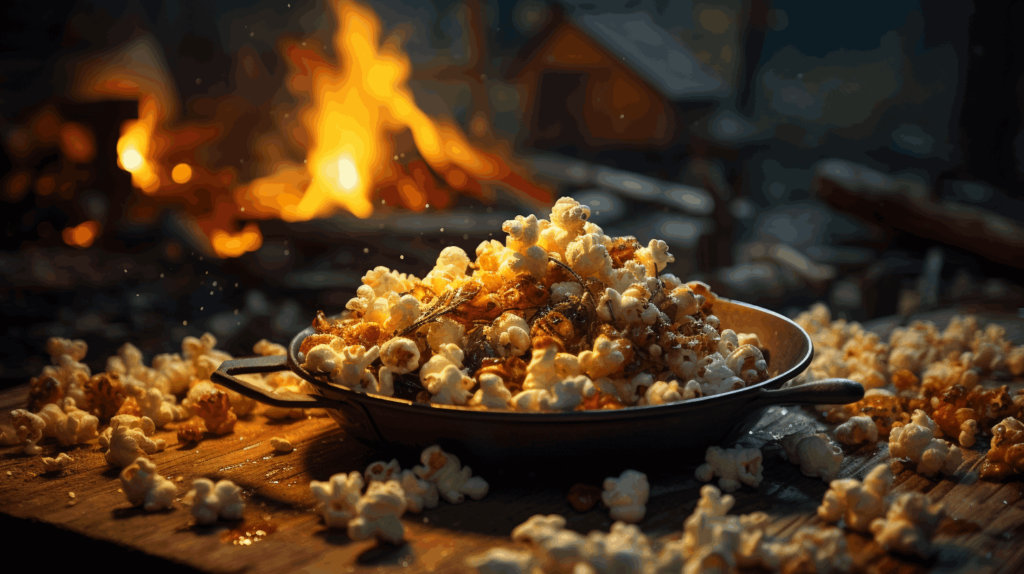Bird owners often wonder if their feathered companions can safely enjoy popcorn as a snack. While birds can consume plain, air-popped popcorn occasionally, it is crucial to understand the nutritional implications. Popcorn lacks essential nutrients and should not be a significant part of their diet.
Excessive salt and fat from buttered or salted popcorn can lead to health risks. Bird owners should prioritize a well-balanced diet of specific feed, pellets, seeds, fruits, and vegetables to meet their pet’s nutritional needs.
Key Takeaways
- Popcorn can be fed to pet birds as an occasional snack, but it should be plain and air-popped without added butter, salt, or artificial seasoning.
- Popcorn offers little nutritional value to birds and should not be a significant part of their diet.
- Pet birds have specific nutritional needs, and the majority of their diet should consist of seeds, fruits, vegetables, water, and commercial pellets.
- Salted and buttered popcorn should be avoided as they can harm pet birds and lead to health complications.
Safety of Feeding Popcorn to Pet Birds
While popcorn can provide a good source of carbohydrates for pet birds, it is essential to consider the safety of feeding popcorn to them due to the risks associated with salted and buttered varieties.
Salted popcorn is unsafe for pet birds as excessive salt intake can lead to health complications. Too much salt upsets a bird’s fluid-electrolyte balance, causing dehydration, excessive thirst, and kidney damage.
Buttered popcorn is also not recommended for pet birds as it contains high amounts of salt and fat. Butter can damage a bird’s nervous system and cause digestive problems.
If cooking popcorn in oil, experts recommend using coconut oil as it contains healthy fatty acids. Coconut oil adds flavor to the popcorn, making it more appealing to birds.
Other forms of popcorn, like salted and buttered, should be avoided to ensure the safety and well-being of pet birds.
Nutritional Value of Popcorn for Pet Birds
Given its high carbohydrate content, popcorn can serve as a valuable energy source for pet birds, although its nutritional value may be limited in meeting their overall dietary needs.
Pet birds have specific nutritional requirements, including water, lipids, proteins, minerals, vitamins, and carbohydrates.
While popcorn provides a high amount of carbohydrates and fiber, it lacks sufficient other essential vitamins and nutrients.
Therefore, popcorn should only be fed as an occasional snack alongside a balanced diet consisting of seeds, fruits, vegetables, water, and commercial pellets.
Avoiding flavored, salted, or buttered popcorn is essential, as it can pose health risks to pet birds.
Plain air-popped popcorn is the safest option, and for added variety, popcorn balls made with birdseed, honey, dried cranberries, and organic peanut butter can be offered as a healthy and tasty treat.
Recommended Ways to Feed Popcorn to Pet Birds
Pet birds should only be fed plain, air-popped popcorn without flavorings, salt, or butter, ensuring this occasional snack’s optimal safety and nutritional value.
Popcorn is a suitable treat for pet birds as long as it is prepared correctly. It should be air-popped to avoid the harmful effects of added oils and fats. Plain popcorn provides a good carbohydrate source, offering birds energy. However, it should be noted that popcorn lacks other essential nutrients necessary for a bird’s healthy development.
Therefore, feeding pet birds a balanced diet consisting of seeds, fruits, vegetables, water, and commercial pellets is essential. Popcorn balls made with additional ingredients like wild bird seed, honey, dried cranberries, and organic peanut butter can also be a healthy and enjoyable snack for pet birds.
It is crucial to avoid salted, and buttered popcorn, as excessive salt intake and high fat content can lead to health complications in pet birds.
Risks of Feeding Salted Popcorn to Pet Birds
Due to the excessive salt content, feeding salted popcorn to pet birds can pose serious health risks, potentially leading to dehydration, excessive thirst, and kidney damage.
Salt upsets a bird’s fluid-electrolyte balance, causing dehydration.
Excessive salt intake can also result in excessive thirst, causing birds to consume more water than usual.
The kidneys of pet birds may be unable to adequately filter and excrete the excess salt, leading to kidney damage over time.
It is essential for bird owners to be aware of the potential dangers of feeding salted popcorn to their pets and to ensure that any popcorn given to birds is plain and free of salt or other flavorings.
Risks of Feeding Buttered Popcorn to Pet Birds
The potential risks of feeding pet birds buttered popcorn include damaging their nervous system and causing digestive problems. Buttered popcorn contains unhealthy fats that can contribute to obesity and other health issues in pet birds. Additionally, the high salt content in buttered popcorn can disrupt the bird’s fluid-electrolyte balance, leading to dehydration, excessive thirst, and kidney damage. Furthermore, butter can cause digestive problems for birds, as their digestive systems are not designed to process high-fat foods.
It is essential for bird owners to be aware of the potential risks associated with feeding buttered popcorn to their pets and to provide them with a balanced and nutritious diet that meets their specific dietary needs.
Moderation in Feeding Popcorn to Pet Birds
An appropriate approach to feeding popcorn to pet birds is to exercise moderation and only offer it as an occasional snack. While popcorn can provide a high amount of carbohydrates and fiber, it lacks other essential vitamins and nutrients that pet birds need for optimal health.
To ensure a well-balanced diet, pet bird owners should primarily feed their birds a variety of bird-specific feed, pellets, seeds, fruits, and vegetables.
However, pet bird owners can make popcorn balls for a tasty and healthy snack using plain, air-popped popcorn mixed with ingredients like wild bird seed, honey, dried cranberries, and organic peanut butter. These popcorn balls should be free from salt, butter, and other seasonings.
Alternatives to Popcorn for Pet Birds
Pet birds may benefit from exploring a range of snack options apart from popcorn. While plain, air-popped popcorn can be given to pet birds as an occasional treat, it lacks essential nutrients and should not be a significant part of their diet.
Instead, bird owners should provide a balanced diet that includes seeds, fruits, vegetables, water, and commercial pellets. These foods offer the necessary vitamins, minerals, proteins, and lipids to promote pet bird growth and overall health.
Additionally, bird owners can consider making homemade snacks like popcorn balls, using ingredients such as wild bird seed, honey, dried cranberries, and organic peanut butter. These treats can provide some variety while being nutritious and enjoyable for pet birds.
It is essential to avoid offering salted or buttered popcorn, as these can harm bird health.
Conclusion
In conclusion, pet birds can safely consume plain, air-popped popcorn as an occasional snack, but it should not be a staple in their diet due to its low nutritional value. Bird owners should prioritize providing a well-balanced diet of bird-specific feed, pellets, seeds, fruits, and vegetables to meet their feathered companions’ specific nutritional needs.
Salted buttered popcorn should be avoided, as it can pose serious health risks. Moderation and variety in feeding practices are crucial to maintaining pet birds’ overall health and well-being.


